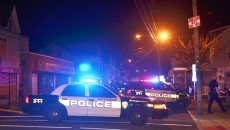Mayor Andre Sayegh’s administration secured a $70.7 million temporary budget that allows the municipal government to remain open through September.
Council members approved the temporary budget, covering spending from July through September, in a 5-0 vote on Monday.
Expenditures in the first three months of the 2020 fiscal year, which started on Jul. 1, amount to a quarter of last year’s $285 million adopted budget, according to municipal records.
The city has to operate through a series of temporary spending measures until a final budget is adopted. Last fiscal year, the budget was adopted just three months before the end of the year.
Sayegh balanced last year’s $285 million budget by raising sewer fees and property taxes. He also received $33 million in state transitional aid. He had expected to get a bigger increase in state aid, telling finance director Marge Cherone to be prepared for a windfall from the state during his inaugural address last July.
Sayegh touted his relationships in Trenton, particularly with governor Phil Murphy, while campaigning for mayor. Over the past year, his critics have repeatedly pointed out mayor’s relationships haven’t brought the promised benefits for Paterson. Instead, those who have a relationship with Sayegh have benefited through municipal jobs and contracts.
Murphy, who repeatedly said he would have Paterson’s back while campaigning in the city, this week, froze the transitional aid line item in the state budget, creating uncertainty over whether Paterson will receive any aid at all.
Sayegh, who campaigned on fiscal responsibility, hasn’t cut back on government spending. He gave an 11-percent retroactive raise to his chief of staff and hired a public relations officer. He also tried to modify a salary ordinance to give his cabinet members pay increases, according to council members.
Council members blocked the mayor’s ordinance to set bigger salary ranges for appointed and elected officials.
Sayegh is expected to have a tough time with the budget as six of the nine members of the City Council seek re-election early next year. His administration sought the council’s approval for a 2-percent tax increase three weeks ago, but council members refused to consider the measure.
Sayegh has tried to start the budget process early. For the first time in decades, the city held departmental budget before the end of the fiscal year. These hearings are usually held in autumn.
The council typically gets an introduced budget towards the end of the calendar year. A final budget isn’t adopted until several months before the end of the fiscal year.
Email: [email protected]



